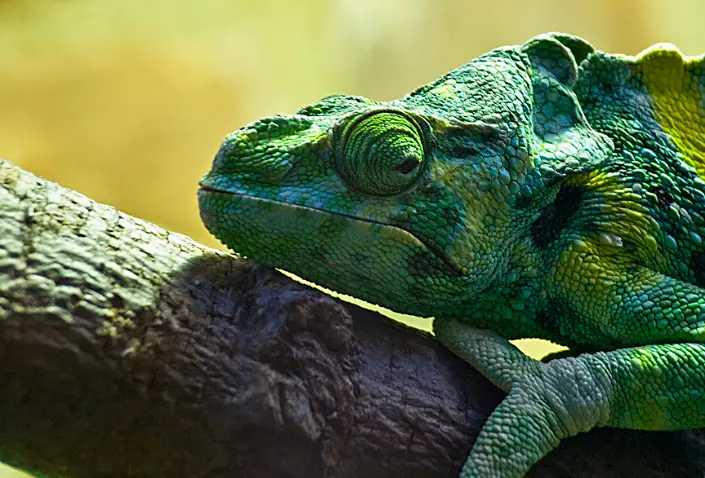Chameleons are intriguing creatures that boast of a myriad of interesting features. From their remarkable color-changing abilities to their iconic tongue strikes, it’s no wonder why these reptiles are a popular choice for many pet owners. However, if you’re a chameleon owner, you may be wondering how your pet responds to loud noises. In this article, we’ll be discussing everything you need to know about how chameleons react to loud noises.
What Makes A Noise Loud To A Chameleon?
Before we dive into how chameleons react to loud noises, it’s important to establish what loud noises mean to them. Loud noises are sounds that generate high decibels, and they can be discomforting to chameleons. Unlike other animals, chameleons do not have outer ears. Instead, they have a small bone called the columella auris that is in direct contact with their eardrums. This means that chameleons are more sensitive to vibrations and can feel them better than they can hear them. Therefore, what we humans might consider to be a loud noise, such as music from a stereo, may not be as discomforting to a chameleon as a sudden noise like a car honk.
How Do Chameleons React To Loud Noises?
When a chameleon encounters a loud noise, it usually responds by freezing in place and remaining motionless. This is because chameleons rely on the concept of “freeze and blend” to avoid predators. When they sense danger, their survival instinct kicks in, and they freeze in place, hoping to blend in with their surroundings. Unfortunately, this instinctual reaction can also be triggered by loud noises, which can cause the chameleon to become stressed and anxious.
In extreme cases, a sudden loud noise can cause a chameleon to become paralyzed with fear. Their bodies can shut down, and they may even become unresponsive. Additionally, repeated exposure to loud noises can have long-lasting effects on a chameleon’s health, including hearing loss and stress.
How Can You Prevent Loud Noises From Upsetting Your Chameleon?
As a chameleon owner, it’s crucial to monitor your pet’s environment to prevent loud noises from bothering them. One way to do this is to create a quiet and peaceful living space for your chameleon. This means avoiding loud music, noisy appliances, and other sources of loud noise around your pet’s enclosure.
Another way to prevent loud noises from upsetting your chameleon is to use soundproofing techniques. For instance, creating a sound barrier around your pet’s enclosure can help reduce the amount of noise that penetrates the enclosure. Additionally, positioning the enclosure away from the noisy areas in your home can also help reduce the impact of loud noises on your chameleon.
What Happens When A Chameleon Is Exposed To Loud Noises For Long Periods?
As mentioned earlier, exposure to loud noises can have long-term effects on a chameleon’s health. Repeated exposure to loud noises can cause stress to build up in your pet, leading to chronic stress-related illnesses. A stressed chameleon is more susceptible to diseases, and their lifespan may be reduced. Furthermore, prolonged exposure to loud noises can also cause your chameleon to lose their hearing, affecting their balance and ability to hunt prey.
What Are The Signs Of Stress In A Chameleon?
As a chameleon owner, it’s important to keep an eye out for signs of stress in your pet. This way, you can quickly identify when your chameleon is not feeling well and take the necessary steps to remedy the situation. Some common signs of stress in chameleons include:
– Lack of appetite
– Aggression
– Being easily startled
– Hiding away from you
– Breathing heavily
– A change in their coloration
What Should You Do If Your Chameleon Is Stressed?
If you observe any of these signs in your chameleon, the first step is to try and identify the source of the stress. As mentioned earlier, loud noises are a common cause of stress in chameleons. If you suspect that this is the case, take steps to reduce the noise levels around your pet’s enclosure. Additionally, you can add stress-reducing plants to the enclosure or use a humidifier to promote relaxation and calmness.
If you’ve tried these measures and your chameleon is still stressed, it’s best to consult with a veterinarian who specializes in exotic pets. They can help identify the underlying cause of the stress and create a customized treatment plan for your pet.
Conclusion
In conclusion, loud noises can be distressing to chameleons. As a pet owner, it’s essential to create a quiet and peaceful environment for your pet to help promote their well-being. By doing so, you’ll be able to enjoy your chameleon’s company without worrying about them becoming stressed.







